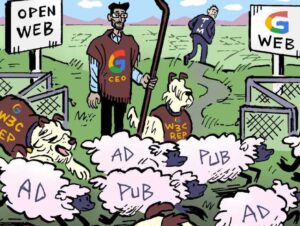By Joshua Koran, Chief Executive Officer, Koran Consulting
AI-powered answer engines are revolutionizing how consumers discover and engage with information. AI-generated answers are slowly taking over, replacing traditional search and its long lists of blue website links.
This evolution brings undeniable convenience to consumers, but also raises an existential question for online publishing: How can we ensure fair compensation for media owners?
Let’s start by being realistic. As the quality of answer engines improves, people will click through to publisher websites less often. This isn’t speculation; it’s inevitable. The challenge is clear, and the solution isn’t to wage war against AI. It’s time to rethink the ecosystem and build a sustainable future for all stakeholders.
‘Stop the Scrape’ won’t bring visitors back
The publishing industry’s prevailing response has been to rally behind the “Stop the Scrape” movement, aiming to programmatically block web crawlers from accessing their content. Last month, Cloudflare received widespread attention by announcing a toggle for publishers to block certain bots.
While this technical approach sounds attractive at first glance, in practice it is both impractical and counterproductive.
Consider Google. The same Googlebot feeds both traditional search and Gemini. Meanwhile, AI capabilities are increasingly being bundled within consumer-facing devices, such as smartphones (Samsung Galaxy), smart speakers (Alexa), desktop operating systems (iOS, Windows and Android), browsers (Perplexity’s Comet, Google’s Chrome Gemini, Opera’s Aria) and even cars (Kia and Nissan powered by LG’s Affectionate Intelligence). This trend will only continue to expand to more applications (e.g., internet-connected eyewear, kitchen appliances and agentic commerce).
While the quantity of traffic to publisher sites may decrease, the value of their content doesn’t disappear.
Discovery still matters in an answer-first world
Blocking AI may sound like a way to protect a publisher’s business model. Ironically, it only makes the situation worse. When publishers disappear from AI-generated answers, they lose brand recognition and further reduce potential visits from referral traffic.
The real issue isn’t access to content. Instead, it is about ensuring publishers are rewarded for the enhanced value their content creates.
The current debate around AI training on copyrighted content suffers from a fundamental flaw: Each side is attempting to dictate terms without meaningfully acknowledging the value the other side provides. On the one hand, answer engines claim the right to freely ingest, index and generate models from content available on the open web. On the other, publishers try to restrict access but ignore emerging consumer behavior.
When publishers demand blanket restrictions or AI companies proceed without adequate compensation, they are building a system destined for failure.
Durable, equitable standards can arise only when both sides agree on the communication protocols and compensation models involved in generating value. Answer engines need publishers.
Publishers provide the authoritative, trustworthy content that makes answer engines credible. Without them, AI services would churn out low-quality or unreliable answers. Meanwhile, answer engines drive discovery in a world where consumers increasingly expect instant answers. Without sustainable business models, this source of trustworthy content will wither. This isn’t just about publisher survival; it’s about maintaining the quality and diversity of information that makes AI services valuable in the first place. Both sides need each other. Pretending otherwise is a recipe for failure.
Building bridges, not walls
The sustainable value exchange between both sides requires three things to happen:
- Fair compensation: Answer engines must pay content creators via licensing fees, revenue sharing and/or attribution mechanisms that reward publishers for the value provided.
- Prominent navigation: Answer engines must provide clear, interactive links for consumers to discover, explore and interact with publisher-controlled environments, not just buried source citations.
- Collaborative standards: Industrywide protocols should be developed jointly by publishers and AI companies, not imposed unilaterally by either side.
The solution isn’t to build walls but construct bridges that benefit both sides. We’ve even seen this transition before, such as when Napster and BitTorrent were replaced with streaming (e.g., Spotify, Netflix and Hulu). Those early platforms facilitated unauthorized access to music and video, but they also exposed consumer demand for instant, frictionless content. The eventual winners weren’t the pirates or the litigators. They were the companies that created viable, equitable alternatives. The same opportunity exists now.
A more collaborative future
Answer engines represent a fundamental shift in how knowledge is created, discovered, distributed and consumed. Navigating this new terrain will require more than defensive maneuvers. It calls for a collaborative reimagining of value exchange.
We can easily imagine a future for publishing that is not dystopian. By adapting to the shift in consumer behavior and investing in systems that fairly reward media owners, we can ensure that publishers remain vibrant sources of innovation and authority, while answer engines continue to inform consumers.
Let’s cease fighting the scraping war and invest our time in building new standards to power a more sustainable ecosystem for all stakeholders.
“The Sell Sider” is a column written by the sell side of the digital media community.
Follow Koran Consulting and AdExchanger on LinkedIn.
For more articles featuring Joshua Koran, click here.












